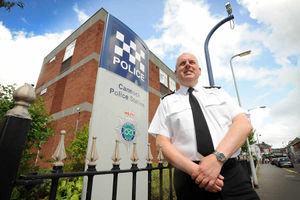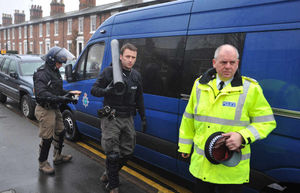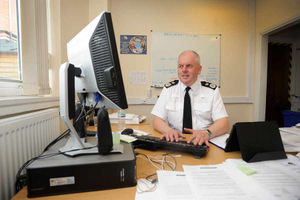Staffordshire Chief Constable Mike Cunningham: Why I'm leaving for a new beat
He was the police chief during the most challenging years his force ever faced, steering it through £30 million of cuts and coping with the loss of hundreds of members of staff.

Now Mike Cunningham is going to watch the watchmen, as one of four people appointed to the post of Her Majesty's Inspector of Constabulary.
As the thin blue line became ever leaner, the Staffordshire Chief Constable has equipped his officers with the latest technology to keep their fingers on the pulse and their boots on the ground.
He is moving on after being approved by the Prime Minister and the Queen to oversee the work of 43 police forces, reporting on their work and effectiveness.
Current inspections include assessments of undercover policing, and of the police's response to domestic abuse and child sexual exploitation.

Mr Cunningham will step into the role next month, replacing Roger Baker, who has been HM Inspector of Constabulary since September 2009.
It was around the same time that Mr Cunningham took up his current post.
He spent the earlier part of his career at Lancashire Constabulary, which he joined in 1987, culminating in his appointment as Deputy Chief Constable in 2007. Before joining the police he was a teacher for two years.
The past five years have not been easy.
The public sector has faced deep cuts in order to balance the books following the financial crisis and the longest recession for decades.
Staffordshire, like other police forces including the West Midlands and West Mercia, has found itself having to wield the axe like never before.
Unpalatable decisions had to be made. Some forces including Staffordshire used a regulation known as A19 to forcibly retire officers with 30 years' service.

Even though that meant depriving the force of experienced and dedicated policemen and women, there was little alternative when it came to quickly reducing numbers, and the wage bill, because serving officers cannot legally be made redundant. And it shaved £4.8 million off the budget.
But 74 officers, almost every one of those forcibly retired in Staffordshire, ended up lodging a compensation claim because a tribunal ruled it was not justified in the case officers from the neighbouring West Midlands, where 591 were made to leave.
So when Mr Cunningham says he has seen 'massive changes' in the force during his time at the top, he is by no means exaggerating.
The father-of-two says working with other agencies had helped to cut crime and new technology was due to be rolled out to allow officers to have information at their fingertips.
The 53-year-old says: "£30m has been taken out of Staffordshire Police over five years.
"We've lost about 700 people in Staffordshire Police, around half police officers and half police staff, but I believe what we've been able to do is to preserve the people that work in front line operational delivery.
"There's been massive changes.
"We've thought of different ways of working. Crime has significantly reduced since 2009. There's massive reductions in things like burglaries and vehicle crime.
"We've underpinned the importance of partnership delivery.
"I'm convinced that good successful community safety is delivered by multi-agencies."

That's a technical term for different organisations working together.
Mr Cunningham said he was proud to have played a key part in setting up the Multi Agency Safeguarding Hub in Staffordshire, which involves social services, police and health agencies working to share information and protect vulnerable children and adults.
He also helped to set up Integrated Offender Management (IOM) in the county. In layman's terms that is bringing together organisations from the public and private sectors as well as volunteers and groups in the community.
They try to stop prolific offenders by getting them away from the revolving door of a life of crime.
Various intensive programmes are used to combine rehabilitation with punishment.
Support can range from assistance in finding accommodation, obtaining training and employment, through to anger management and treatment for substance misuse.
See Mr Cunningham's video message to officers and staff:
Mr Cunningham says: "We are regarded as a national lead in IOM.
"We have been able to get so many other agencies involved that it works very effectively. We know some individuals who were prolific offenders have significantly reduced or stopped offending."
The eyes and ears of bobbies on the beat are being aided by advances in technology as well.
He says the use of number-plate recognition devices had increased and helped to drive down crime, giving officers access to details about cars and vans that may have been involved in crime.
Other technology is on the way too. The theory is that the more that is done to free a police officer from paperwork or having to be in the office, the more time they can spend out on the streets where decent people can be reassured and criminals can be made to think again.
"We are about to roll out modern up-to-date technology through the use of tablets", Mr Cunningham says, referring to the likes of Apple's iPad or its competitors.
"It means officers will have information at their fingertips in the way we've never had before."
Deputy chief constable Jane Sawyers is taking up the role of interim chief constable at Staffordshire while a new recruitment process takes place.
Mr Cunningham's new job is initially for five years at an annual salary of up to £185,971.
And it will centre around inspecting and monitoring police forces in the north of England.
Mr Cunningham, who says he will remain living in the Eccleshall area, says: "It's been a massive privilege and honour to head up an operational police force. I'm very proud of what the force has achieved.
"I feel excited about my new role and I would like to think I'm leaving behind a motivated, committed team of people who are focussed on protecting the public.
"I leave Staffordshire Police very proud of the men and women who keep people safe and reassured and I thank them for their outstanding work."




